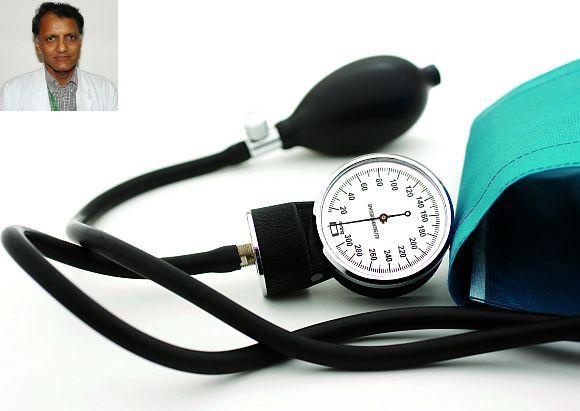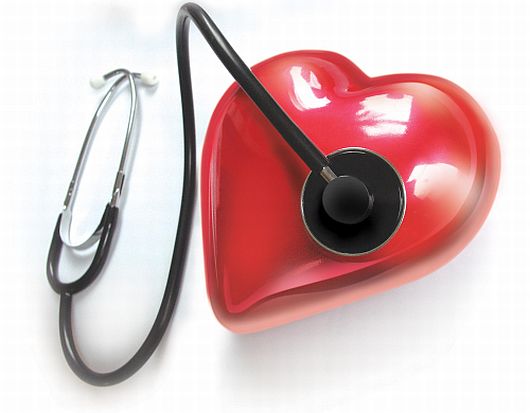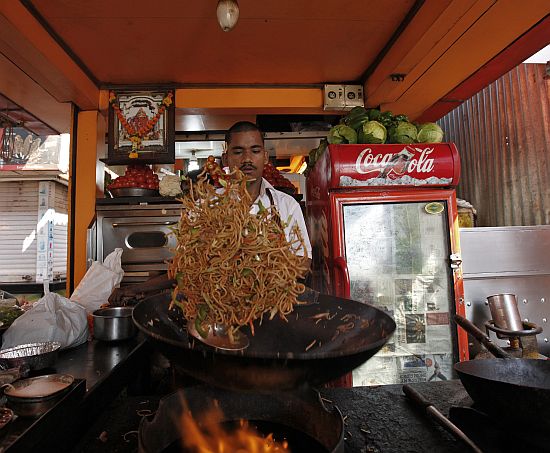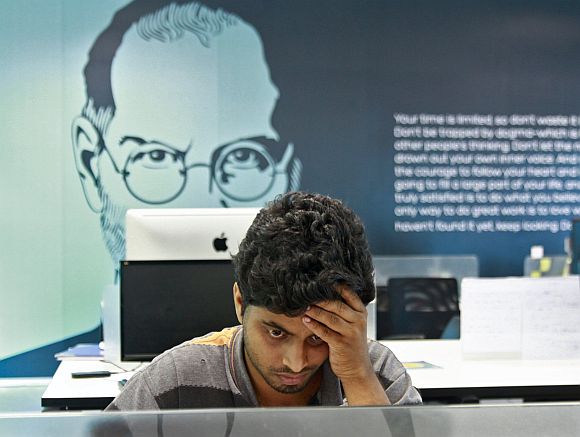 | « Back to article | Print this article |
'Hypertension is leading cause of death in urban areas'
Under the guidance of Dr Rajeev Gupta, head of medicine and director, research at the Fortis Escorts Hospital, Jaipur, a study was undertaken among the urban population in India on hypertension. The study has come out with some startling revelations.
Dr Gupta, the chairman of the research development unit of the Rajasthan University of Health Sciences, Jaipur, is also involved in the advisory capacity with government of India (Indian Council of Medical Research and Health Ministry) and World Health Organisation.
He is internationally known for his contributions to cardiovascular epidemiology. He was instrumental in setting up the first non-governmental epidemiology centre in India. The Jaipur Heart Watch Study that he initiated in 1990 is the longest ongoing cardiovascular epidemiological study in India. He is an award winner from the government of India, Indian Council of Medical Research, Cardiological Society of India, etc.
In this exclusive interview with Rediff.com's Shobha Warrier from Jaipur, Dr Gupta talks about the study and what the urban population to do to fight hypertension.
Any particular reason why you decided to have a study on hypertension among the urban population in India?
We see hypertension as an epidemic but mainly urban. You take any disease, everything is three times more in the urban population as compared to the rural population. So, we had decided that the focus had to be the urban population.
It is politically correct to say that we work in the rural areas but as far as hypertension is concerned, it is more prevalent in the urban areas.
Click on NEXT to read further...
Highest number of people with hypertension in India is in the north and north-east
Your study found that 32 percent of men and 30 percent of women in the urban areas suffer from high BP. Is it an alarming statistics?
Yes, it is alarming. What we are talking is the prevalence among the adults. This is the case worldwide too.
If you look at the worldwide statistics, 20-40 percent of the urban population suffers from high BP. Some of the studies found that 50 percent of the adult population among the Parsi group in Mumbai has high BP.
In Kerala also, the prevalence is very high.
Your studies have found that Jammu has topped the list with 36.4 percent men and 38.6 percent women have hypertension while Ahmedabad has the lowest percentage with 12.9 and 11.9 percent respectively. Could you find the reason for this?
Yes, this is what we found. We haven't done any study on the reasons which we would soon be doing. We have all the data on the diet, physical activities, obesity level, etc which we will be using to study the statistics.
Our sample size in each location is 500-1,000. According to the study done by IMR, the highest number of people with hypertension in India is in the north and north-east.
We did studies in 11 cities in the country. Jammu, Chandigarh, Bikaner, Jaipur, Ahmedabad, Belgaum, Madurai, Nagpur, Lucknow, Patna and Dibrugarh.
Click on NEXT to read further...
'People are consuming more salt these days'
Why did you decide not to include the metro cities?
We have deliberately excluded the metro cities as so many studies are being conducted there. Our intention was to go to the real middle-class locations.
What could be the reason why more and more people belonging to the middle-class are getting high BP in the urban areas?
The main reasons are diet and lifestyle. People are consuming more salt these days as many eat outside a lot. Urban people consume fast food also a lot -- both Indian and western.
Another reason is obesity; the way urban people are putting on weight is a cause for concern. In the last 20 years, it has gone up by 50 percent.
In another paper, we did a study on the co-relation between urbanisation and prevalence of cardiovascular diseases.
We have found that the more urbanised an area is, the more the incidence of hypertension.
Click on NEXT to read further...
'IT, BPO employees getting hypertension is a cause to worry'
200 million urban middle-class people suffer from hypertension. How alarming is the situation?
We are only talking about the urban middle-class. There are many millions in the rural areas too. That makes the situation even more alarming.
But mild hypertension can be corrected by changing the lifestyle.
In what way people should they change their lifestyle?
First, you should reduce the consumption of salt, fat and reduce your weight. Next is, stress management. You can manage stress by doing yoga, meditation, and other techniques. Daily exercise is also very important.
Many studies found that young professionals below the age of 30 suffer from hypertension these days. How do you look at this new phenomenon?
Yes, young IT professionals and BPO employees getting hypertension is a cause to worry. The reasons for their condition are psychological and dietary practices. In the case of the BPO employees, the change in the body rhythm is one of the reasons. Next is the loneliness that they encounter in the working environment, and the third reason is the consumption of fast food which is very common among them.
Pre-cooked meals contain more sodium. Unless the government put some restriction on the amount of sodium in the pre-cooked meals, this is going to cause a lot of problems.
Click on NEXT to read further...
'Check your blood pressure regularly. Hypertension is a silent killer'
With urbanisation spreading its wings, do you feel hypertension is going to be a major health hazard that India is going to face now?
I wouldn't say, urbanisation; I would call what is happening as wrong urbanisation. Our cities are unplanned. There are no walking facilities, there are no parks, and we have no control over pollution.
If we had the right kind of urbanisation with walking spaces, less of pollution and proper public transport system, this can be controlled.
Is it a time bomb that can burst any time?
It has already started affecting us. Studies have found that heart disease is the number one cause of death in India.
We have found that young people dying of heart disease in India is due to hypertension and diabetes. We have very high mortality rate of heart disease compared to any other part of the world. While in the rest of the world, only 2 percent die of heart disease, but in India it is 10 percent.
Another reason is the huge divide between the urban and rural population.
Even an United Nations committee has found that hypertension is the most important reason for death in the world. Hypertension can lead to stroke. Though we don't talk about stroke much, it is a major cause to worry in both the urban and rural areas.
What is the advice that you would like to give to the people?
What I would advice is, everybody should have a healthy lifestyle. More importantly, you should check your blood pressure regularly as it is a silent killer. If you have hypertension, you should see to it that it is under control. You can control it by many means like diet, yoga, medicine, etc.
Click on NEXT to go further...
Top PHOTO features of the week
Click on MORE to see another set of PHOTO features...





